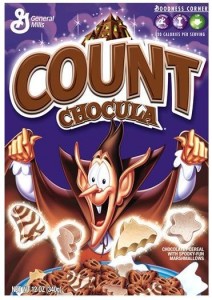
Once upon a time, I wrote a post about how words that end in -cula mean little. For example: molecule means little mass, and granule means little grain. Then! Suddenly! Today I thought of another.
Dracula! Dracula is Draco + cula. What is draco? Draco means dragon. Spoiler: Draco Malfoy = Dragon Bad Faith. Learn more Harry Potter names here.
The original vampiric association with Dracula was through Vlad III, known was Vlad Tepes, Tepes meaning Impaler. Curiously, Dracula was Vlad’s family name, the patronym. The internet doesn’t tell me much more than that, which is why this post has been in my drafts folder for seven months…
(EDIT: Commenter oetpay assisted with a link below, which explains that Vlad Dracul-ea means son of (-ea) Vlad Dracul, who was associated through dragons through the family heraldic crest. So it turns out that analyzing dracula and chocula as little dragons and little chocolate is not historically accurate. But we could say Count Chocula is son of Count Chocul.)
[and then suddenly…]
October 21, 2012
in candy,dragons,eponyms,food,insignificant linguistics mystery,latin,morphemes,Words & Origins
Linguists in academia don’t seem very fond of word origins. They like to focus on the tiny phonological bits of languages [p,t,k] or the grand syntactic structure that binds sentences together. Somehow, the very juicy goodness of language, the words, are either too big or too small to care about. BOO. I love word origins. I don’t know how important they are, but I want to spend all my time paying attention to them. But! Before we have fun, there are some ground rules that we need to agree on before we can safely and happily play together in the sandbox of word origins. This is our first negotiation on this subject, this should continue as a dialogue (probably in the comments). I’ll start: Here are 3 rules to counteract misconceptions I often encounter.
1. The origin of a word is not the true or right meaning, just the literal one.
- WRONG: “The true meaning of hippopotamus is river horse.”
- RIGHT: “The literal meaning of hippopotamus is river horse, how cute is that? You can see these word-parts in other words you already know. Mesopotamia is the land between rivers, and a hippogriff is made of a horse and an eagle.” (See Best Monday Comic Ever)
[and then suddenly…]
February 15, 2012
in career,english,Etymology,etymonline,history of language,morphemes,Words & Origins
A few years ago, I took first year Latin at PSU. I didn’t continue Latin because I got a job, and it turns out I hate declining nouns and adjectives. It is three times as much work. The professor was great, seemingly normal, but with a great unexpected affection for Elvis (pronouced Elwees in Latin). I really liked learning the new vocab and connecting it to modern words I know in English, Spanish and French. I also loved conjugating the verbs and learning the four principle parts like in the verb ‘regere,’ to rule or reign: Rego, Regere, Rexi, Rectum.
[and then suddenly…]
May 15, 2011
in best post ever,career,etymonline,history of language,insignificant linguistics mystery,IPA,latin,morphemes,spanish,wordnik

